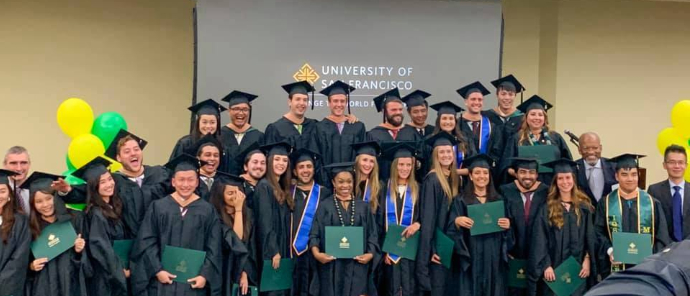Back in August 2010, thirty international students were attending the graduation ceremony of a brand-new program in Global Management at the main campus of the University of San Francisco. The group had just finished a new, one of a kind graduate program that had started in August 2009 at IQS School of Management (Ramon Llull University, Barcelona), continued from January until May 2010 at Fu Jen Catholic University (New Taipei City), and concluded at the University of San Francisco, in California.
The Master in Global Entrepreneurial Management (MGEM) was the result of a bold bet by three Jesuit Universities that shared one common vision: to prepare global business leaders capable of dealing with the challenges and the fast pace of change of our global economy. The initial discussion of launching a Global Management and Entrepreneurship program with learning experience across three continents happened in October 2007 during the first US Jesuit Business School Deans’ joint meeting with the board members of the International Association of Jesuit Business Schools (IAJBS) held at St. Louis University, St. Louis, Missouri. The actual Master’s design took place the following year in the Island of Kinmen –Taipei–, where curriculum design, tuitions fees, admission criteria, and related details were discussed by the working teams of the three universities including the respective University Deans, and Professors Michael Lee, Zhan Li, and Carlos Moslares. The process concluded with the signature of the MOU in June 2008 by Dean Ming-Hsien Yang from FJU, Dean Jesus Tricás from IQS, and the Provost of the USF James L. Wiser. Finally, the program was launched officially in Barcelona in September 2009.
The year 2019 marked the celebration of the 10th anniversary of the MGEM. During the last decade, more than four hundred students from forty nationalities have followed the same path and are now part of the growing community of MGEM alumni. Ten years after its launch, the program is recognized as one of the top programs in Global Management by the Financial Times (global rank #31, and #1 in International Student Experience), QS, and Times Higher Education.
The program has been evolving and improving over time. New students start now every year in early September at IQS School of Management where they learn about cross-cultural management and the challenges and opportunities of globalization for companies. They also take a deep dive into entrepreneurship and advanced finances. While in Barcelona, students team up to work in consulting projects with major multinationals, where they have a glimpse of the intricacies of the corporate world. Likewise, they work with startups going through an acceleration program, in order to understand the challenges of a business during its early stages as a new venture.
Moving on to Taipei, students continue learning about innovation, strategy, and operations management, while completing a full business plan and a business research (“Thesis”) paper. Just before moving to the USA, the group spends one week in the Great Shanghai area, where they have a glimpse of some of the major companies of Continental China that are driving the growth of the Asian economy.
Finally, during the semester at the University of San Francisco, students learn about global marketing, funding of new ventures, social entrepreneurship, and business analytics tools. A new round of consulting projects with mid-size companies of the Bay Area in San Francisco rounds up the hands-on experience of the group with real companies all over the world. After completing the course, students are ready to take on high-level management positions in corporations, SMEs, and startups.
Looking back to that first meeting in 2007, the founders of the Master in Global Entrepreneurial Management still recognize as of today that the task of building a program with such complexity seemed daunting at the beginning. Nevertheless, the results twelve years later are a testimony that the will to collaborate amongst the schools of our network can break cultural and physical distances and create new, differentiated programs, with unique added value for our students and for our community.
Authors:
Dr. Michael T.S. Lee
Vice-president of International Affairs, Fu Jen Catholic University
Dr. Carlos Moslares
Dean, IQS School of Management
Dr. Carlos Malet
Director of the Master in Global Entrepreneurial Management, IQS School of Management

